Results
-
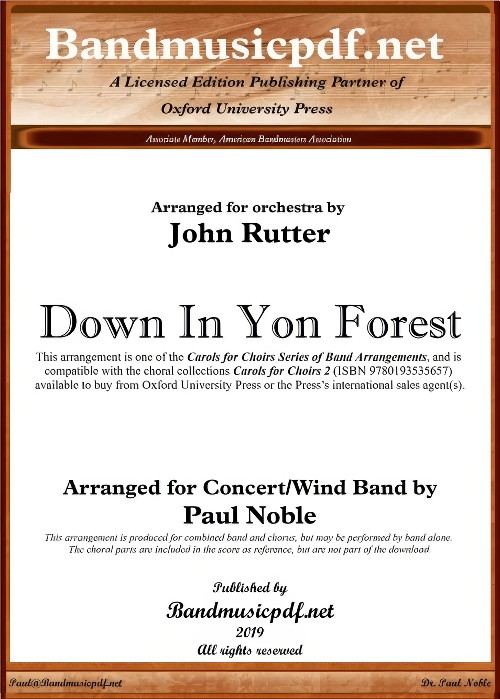 £75.00
£75.00Down in Yon Forest (Concert Band with Optional Choir - Score and Parts) - Rutter, John - Noble, Paul
Down in Yon Forest is a traditional English Christmas carol dating to the Renaissance era, ultimately deriving from the anonymous Middle English poem known today as the Corpus Christi Carol. The carol has been arranged in modern English by John Rutter. This arrangement represents one in the Series of Band Arrangements compatible with David Willcocks' Carols for Choirs.
Estimated dispatch 7-14 working days
-
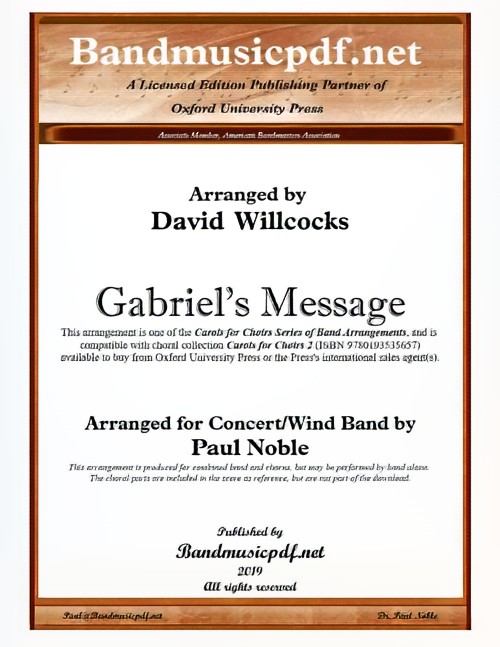 £75.00
£75.00Gabriel's Message (Concert Band with Optional Choir - Score and Parts) - Noble & Willcocks
Gabriel's Message is the familiar story of Mary: Most highly favoured lady, for known a Mother thou shalt be, all generations laud and honour thee. This a cappella setting by David Willcocks is based on three or four linear parts, which have been interchangeably used to enhance this compatible arrangement for band. In addition to performing it as written, the conductor may choose a variety of family-oriented parts complete within themselves to further vary the presentation. This arrangement represents one in the Series of Band Arrangements compatible with David Willcocks' Carols for Choirs.
Estimated dispatch 7-14 working days
-
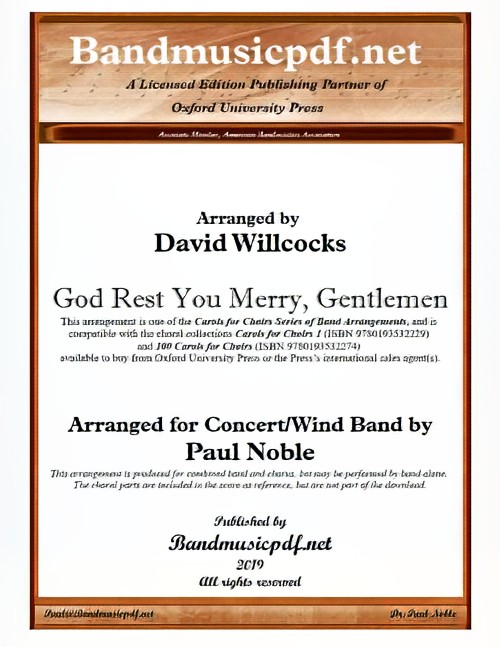 £75.00
£75.00God Rest You Merry, Gentlemen (Concert Band with Optional Choir - Score and Parts) - Noble & Willcocks
God Rest You Merry, Gentlemen is an English traditional Christmas carol. It is one of the oldest extant carols, dated to the 16th century or earlier. There are contradictory interpretations of the meaning of the phrase rest you merry at the time it was written in this carol: the verb 'rest' in the sense to keep, cause to continue to remain is typical of 16th to 17th century language. The adjective 'merry' in Early Modern English had a wider sense of pleasant; bountiful, prosperous. Some interpretations have 'merry' meaning 'mighty'. This arrangement represents one in the Series of Band Arrangements compatible with David Willcocks' Carols for Choirs.
Estimated dispatch 7-14 working days
-
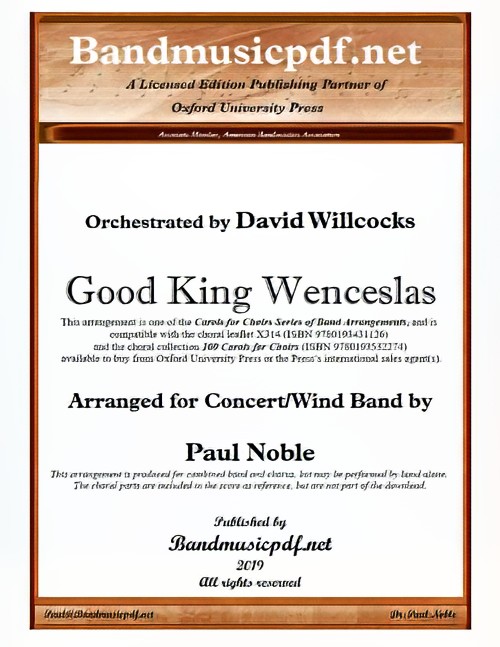 £75.00
£75.00Good King Wenceslas (Concert Band with Optional Choir - Score and Parts) - Noble & Willcocks
Good King Wenceslas is a Christmas carol that tells a story of a Bohemian king going on a journey and braving harsh winter weather to give alms to a poor peasant on the Feast of Stephen (December 26, the Second Day of Christmas). During the journey, his page is about to give up the struggle against the cold weather, but is enabled to continue by following the king's footprints, step for step, through the deep snow. The legend is based on the life of the historical Saint Wenceslaus I, Duke of Bohemia or Svat Vclav in Czech (907-935). The name Wenceslas is a Latinised version of the old Czech language Venceslav. In 1853, English hymnwriter John Mason Neale wrote the Wenceslas lyrics, in collaboration with his music editor Thomas Helmore, and the carol first appeared in Carols for Christmas-Tide, 1853. Neale's lyrics were set to the melody of a 13th-century spring carol Tempus adest floridum (The time is near for flowering) first published in the 1582 Finnish song collection Piae Cantiones. This arrangement represents one in the Series of Band Arrangements compatible with David Willcocks' Carols for Choirs.
Estimated dispatch 7-14 working days
-
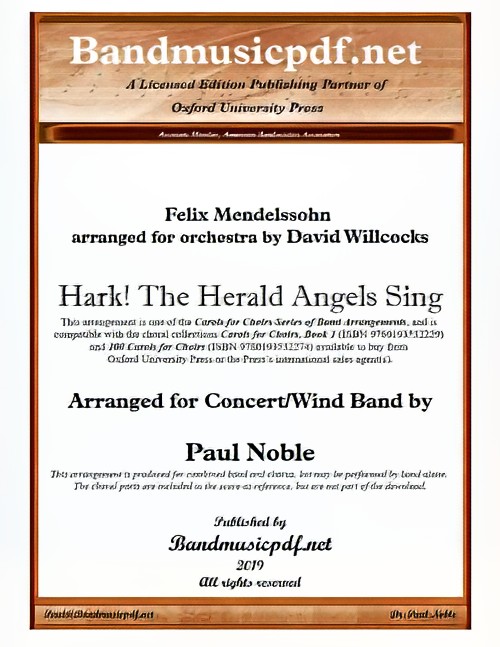 £75.00
£75.00Hark! The Herald Angels Sing (Concert Band with Optional Choir - Score and Parts) - Mendelssohn, Felix - Noble & Willcocks
Hark! The Herald Angels Sing is a Christmas carol that first appeared in 1739 in the collection Hymns and Sacred Poems. Its lyrics had been written by Charles Wesley. Inspired by the sounds of London church bells while walking to church on Christmas Day, he wrote the Hark poem about a year after his conversion to be read on Christmas Day. The popular version is the result of alterations by various hands, notably by Wesley's co-worker George Whitefield who changed the opening couplet to the familiar one, and by Felix Mendelssohn, whose melody was used for the lyrics. In 1840, a hundred years after the publication of Hymns and Sacred Poems, Mendelssohn composed a cantata to commemorate Johann Gutenberg's invention of movable type printing, and it is music from this cantata, adapted by the English musician William H. Cummings to fit the lyrics of Hark! The Herald Angels Sing, that propels the carol known today. This arrangement represents one in the Series of Band Arrangements compatible with David Willcocks' Carols for Choirs.
Estimated dispatch 7-14 working days
-
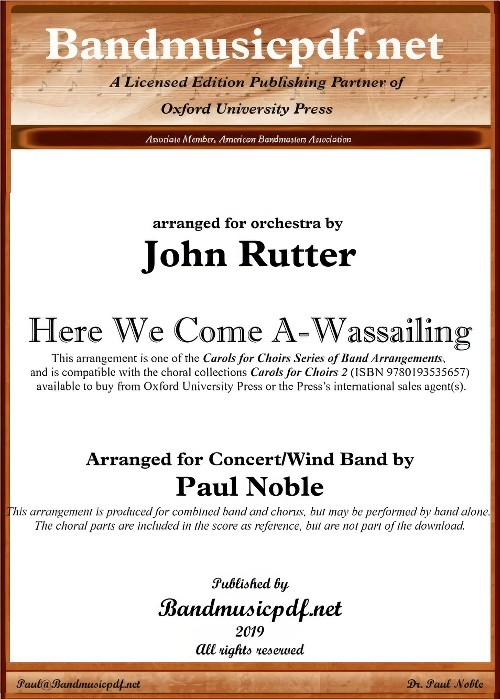 £75.00
£75.00Here We Come A-Wassailing (Concert Band with Optional Choir - Score and Parts) - Noble & Rutter
Here We Come A-wassailing (or Here We Come A-caroling) is an English traditional Christmas carol and New Year song, apparently composed c. 1850. The old English wassail song refers to 'wassailing', or singing carols door to door wishing good health, while the a- is an archaic intensifying prefix; compare A-Hunting We Will Go and lyrics to The Twelve Days of Christmas (e.g., Six geese a-laying). According to Readers Digest; the Christmas spirit often made the rich a little more generous than usual, and bands of beggars and orphans used to dance their way through the snowy streets of England, offering to sing good cheer and to tell good fortune if the householder would give them a drink from his wassail bowl or a penny or a pork pie or, let them stand for a few minutes beside the warmth of his hearth. This arrangement represents one in the Series of Band Arrangements compatible with David Willcocks' Carols for Choirs.
Estimated dispatch 7-14 working days
-
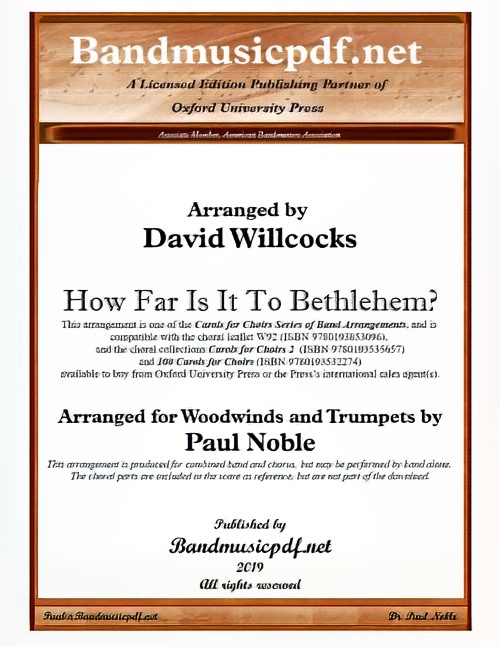 £75.00
£75.00How Far is it to Bethlehem? (Concert Band with Optional Choir - Score and Parts) - Noble & Willcocks
Written by Frances Alice Chesterton, wife of G. K. Chesterton, How far is it to Bethlehem? this carol expresses the profound longing we feel to experience firsthand the miracle of the Christmas story, not just as thinking adults, but with the wonder of children. The childlike question How far is it to Bethlehem? and the simple response Not very far begin this gentle carol. The lyrics go on to reveal the little smiles and tears that children bring as their gifts, as well as their inherent trust, as they fall asleep. This arrangement by David Willcocks is for SSA, and the instrumental accompaniment is the same voicing in groups of woodwinds and trumpets. This arrangement represents one in the Series of Band Arrangements compatible with David Willcocks' Carols for Choirs.
Estimated dispatch 7-14 working days
-
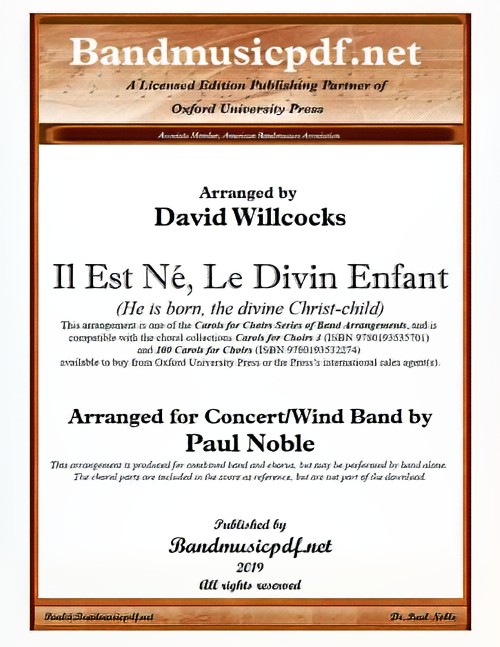 £75.00
£75.00Il Est Ne, le Divin Enfant (Concert Band with Optional Choir - Score and Parts) - Noble & Willcocks
Il est n, le divin Enfant (English: He is born, the divine Child) is a traditional French Christmas carol, which was published for the first time in 1862. The text of the carol, which is written in four stanzas, details the birth of Jesus and the wait of 4000 years for the event, as told by the prophets. It both observes the humility of God's birth in a stable and calls on the Kings of the Orient to attend the child. This arrangement represents one in the Series of Band Arrangements compatible with David Willcocks' Carols for Choirs.
Estimated dispatch 7-14 working days
-
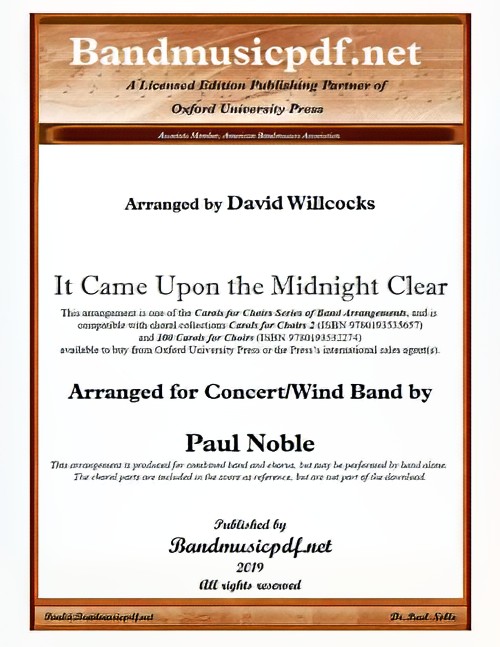 £75.00
£75.00It Came Upon the Midnight Clear (Concert Band with Optional Choir - Score and Parts) - Noble & Willcocks
It Came Upon the Midnight Clear (1849), sometimes rendered as It Came Upon a Midnight Clear, is a poem and Christmas carol written by Edmund Sears, pastor of the Unitarian Church in Wayland, Massachusetts. Writing during a period of personal melancholy, and with news of revolution in Europe and the United States' war with Mexico fresh in his mind, Sears portrayed the world as dark, full of sin and strife, and not hearing the Christmas message. In Commonwealth countries, the tune called Noel, which was adapted from an English melody in 1874 by Arthur Sullivan, is the usual accompaniment. This tune also appears as an alternative in The Hymnal 1982, the hymnal of the United States Episcopal Church. This arrangement represents one in the Series of Band Arrangements compatible with David Willcocks' Carols for Choirs.
Estimated dispatch 7-14 working days
-
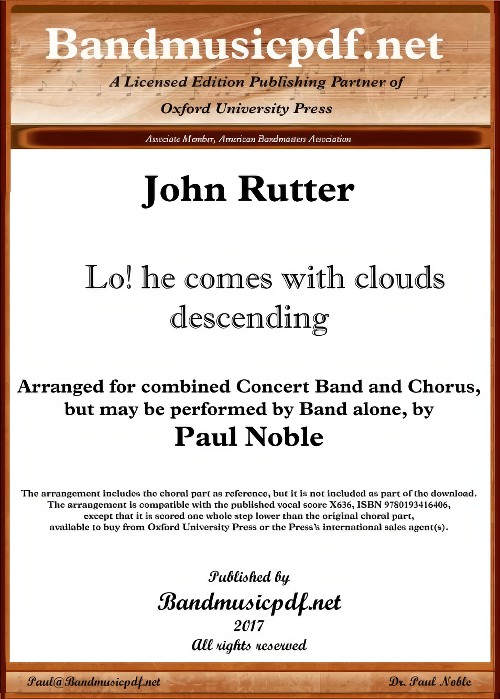 £75.00
£75.00Lo! He Comes with Clouds Descending (Concert Band with Optional Choir - Score and Parts) - Noble & Willcocks
Lo! He Comes with Clouds Descending is a hymn with a text by John Cennick (1718-1755) and Charles Wesley (1707-1788). Most commonly sung at Advent, the hymn derives its theological content from the Book of Revelation relating imagery of the Day of Judgment. Considered one of the Great Four Anglican Hymns in the 19th century, it is most commonly sung to the tune Helmsley, first published in 1763. This arrangement represents one in the Series of Band Arrangements compatible with David Willcocks' Carols for Choirs.
Estimated dispatch 7-14 working days
